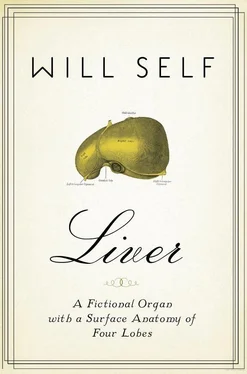After the piano had been brought on for the soloist — with some huffing and puffing — the second piece in the first half of the concert began. The San Franciscans obediently transported him through the choppy waters of the Allegro, if not con brio, then at least with dispatch; then the young man — who, Joyce didn’t need the programme to tell her, was French from the tip of his ascetic nose to the ends of his lily-white fingers — geared himself down for the Largo of Beethoven’s Third Piano Concerto.
His forearms and thighs appeared to stretch out from his forward-canted trunk. Still, no fiery embers fell from this Böögg : he might have been typing so far as Joyce was concerned. To her left, Ueli Weiss’s thumb supported his smooth-shaven chin, while his manicured index finger probed the soft barbs on his upper lip. Frozen and tantalized, she watched the white half-moon of his nail trace the wing of his nostril.
At the interval Joyce had been desperate to pee; she rose but Ueli remained solidly seated, until, the applause pounding her ears, she was compelled to clamber over his knees.
In the second half the San Franciscans abandoned their factory and went wandering in the Alpenglow of Strauss’s tone poem. Joyce was too tired to accompany them, as they humped their harps and drums into deceptively pillowy couloirs and across polished blue glaciers. Besides, there was a fat lady, not singing but shouting Domini, Domini , as a Brummie slapper might bawl at an unwanted child, her every ragged warble bracketed by the still louder cries of the bass baritone, Derry, who stood outside the Top Rank Bingo Hall at Five Ways, intoning mournfully, Dom-i-ni, Osanna in excelsis . She ran away from him and found herself beneath the purple sky of Monsignor Reiter’s soutane, with his pale face — where it shouldn’t be! — the sun.
Either Ueli Weiss didn’t deign to wake her, or he cared not that Joyce slept. She was roused by the deadening réclamé of the Zürichers, only to witness the spectacle of the mousy first violinist scuttling into a bouquet. As the clapping scattered, Ueli said invitingly, ‘Und now, supper at Casa Ferlin.’
Joyce hadn’t gone so far as to obtain a full fur, but the saleswoman at Weinberg’s had persuaded her to buy a black leather coat with genuine mink at cuffs and collar. Her old-new coat was abandoned. Beneath the leather was a real dress, plum silk, cut on the bias; and beneath the dress there was an armature of more silk and wire, that, amazingly, provided her with a not unbecoming décolletage. The lank grey crop that the hairdresser in Oerlikon had treated with not much more than professional neglect — shampoo, set, trim, the hedging of old growth — was, at Marianne’s instigation, borne across town to Schwartzkopf ’s on Urianastrasse, where it was artfully dyed, before having completely new topiary.
Joyce waited on the steps of the Opernhaus while the Schneider went to get his little clothes iron of a Mercedes. When he returned, and hustled round to open the door for her, Ueli Weiss gaped at Joyce — but was this because of the makeover, or the veil of night and the rouge of street lamps? He kept darting looks at her as he pressed the tarmac around the town to Stampfenbachstrasse. In the restaurant’s vestibule Ueli uttered a small, animalistic grunt of appreciation when she disrobed; or perhaps, since there was a strong smell of pasta and baby cow meat , this was only coincidental.
Beside a slim golden pillar, with a tapestry-covered banquette scratching between her shoulder blades, Joyce scanned first the menu and then the room. The latter was nothing special, with its off-white walls, undistinguished oil paintings and fireplace stripped of paint in emulation of a rusticism that had never existed. Joyce might have wondered why Ueli Weiss’s chosen women found such an ambience seductive, were it not that she already knew that seduction — in her case as much as in theirs — was not an issue.
The discussion of menu selections, and then, when the entrées arrived, of the music they had just heard, was as much a formality as these events themselves. The ear-worm of Scoresby’s semiprofessional Requiem bored into Joyce as she bent to scallops caught in a chicory basket. Benedictus qui venit in nomine Dom-i-ni . The quiff-flicking in the Arts Centre canteen — did it all lead, ineluctably, to this? And had the others — who, she was sure, whether young or old, had been lacking in self-esteem, seeking the stiffest, and shortest-lived, acceptance — been as numb as she? Drained of melody, what remained of anyone’s life? A narrative trajectory as straight and dull, as discordant and crowded, as the M1. Benedictus qui venit .
Bread and wine were needed for a benediction. Joyce ordered tagliatelle, with an amatriciana sauce, and drank deep of the Gama-ret, a bloody red that Weiss regally called for — first one bottle, then a second.
He talked, if at all, of his first wife and their damaged child. Her virtues, it seemed, were many — although they were lost in the retelling: a loyal wife, a doting mother, a superb homemaker — the very ideal of a hausfrau; lovely to gaze upon as well. The trauma of Erich’s birth, the severity of his disability, these had been, well, there was no need for him to say this — the implication was as weightily present as he himself — but were it not for their faith.
Weiss had dealt with his own dish — some meatiness swimming in a jus — in double-quick time, and now his hands were free to flop in the orangey light flung down by the fake oil lamp on their table. They were hands, Joyce mused, that always seemed gloved — sheathed in their own tanned hide. She steeled herself, imagining what they would feel like flayed, then dug down between her buttocks and a mattress.
Joyce saw herself reflected in Ueli Weiss’s brown eyes: the two tiny miracles of her birth and her resurrection. He said, ‘She died of pancreatic cancer, you know.’
She hadn’t. The waiter arrived, his hips epicene below his short white jacket, and asked if they would like cream with their coffee. Weiss declined, then said, ‘Here in Switzerland we have the highest levels of pancreatic cancer — you are not knowing this, also?’ His tone verged on the hectoring. ‘It is the creams, the milk and the butter — the fats, you say, we are eating them all the times. We think, maybe, we are still up on the Alps, looking after the goats and the cows — like Heidi, you know?’
And this, she did know.
There could be no question of them going to the apartment that Ueli shared with Marianne in Seefeld — this was how Joyce thought of it, not, despite the evidence of the rings, as a marital home. She knew it was close to St Anton’s, and, while they were at Baden together, Marianne had explained in some detail how she had renovated the top-floor flat where Ueli’s parents had lived, bought a second flat in the adjoining building, then knocked through the walls to create a defiantly contemporary space.
Joyce placed Marianne in this chic penthouse as Ueli Weiss skimmed the rainy streets with the Mercedes. Marianne in black silk pyjamas on a black leather divan. Lobby music welled from concealed speakers while she turned the pages of a fashion magazine. Her abstraction — it was more integral to her than her faith.
As for Erich, it wasn’t possible to place him in this rational environment; he must be in the basement, beside the roaring boiler, crouching in an outsized plastic sack, waiting to be put out with the rest of the rubbish.
Benedictus qui venit in nomine . Ueli had booked a room at the Widder, Dom-i-ni, nat ü rlich . Either because they didn’t care, or else because they were accustomed to his liaisons, the staff showed no particular interest in them; and yet, and yet. surely this was the point at which somebody should’ve balked and made a pointed remark?
Читать дальше












